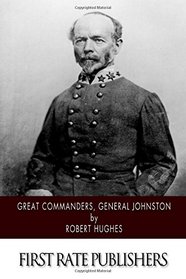This is an engaging book with lots of lesser-known information and analysis. All Southern generals ride in the shadow of Bobby Lee. This book shows why this shouldn't be the case; are you aware that Robert E Lee didn't become overall leader of all the Southern troops until near the end of the conflict?
The Johnstons (Scottish) met the Lee's of VA during the American Revolution and were friends for generations. Joseph E Johnston was at West Point along with Robert E Lee. When the Civil War was about to begin, these 2 generals in the Army left to defend VA; this left a leadership vacuum in the North.
This book places a glaring light on the foibles and power plays of various Confederate leaders and military commanders. It also shows the poor outcomes when government executives try to dictate military policy (from afar) during battles.
Jefferson Davis, in this book, is showed to be a seriously flawed leader; he promoted pet generals and turned out competent generals to make way for his inept friends. Davis carried grudges; he didn't seem to be able to accept valid criticism shared in private and in the mildest of terms.
I only saw two problems with this history: The book would have been more understanding (to non-Civil War enthusiasts) if there had been drawings to accompany the descriptions of the major battles and the editing of the Kindle was awful.
I've just noticed that this book is written by Johnston's great-nephew; that may color some of the analysis and caustic comments. If I read anything else that vindicates Jefferson Davis, I'll rewrite this review.
The Johnstons (Scottish) met the Lee's of VA during the American Revolution and were friends for generations. Joseph E Johnston was at West Point along with Robert E Lee. When the Civil War was about to begin, these 2 generals in the Army left to defend VA; this left a leadership vacuum in the North.
This book places a glaring light on the foibles and power plays of various Confederate leaders and military commanders. It also shows the poor outcomes when government executives try to dictate military policy (from afar) during battles.
Jefferson Davis, in this book, is showed to be a seriously flawed leader; he promoted pet generals and turned out competent generals to make way for his inept friends. Davis carried grudges; he didn't seem to be able to accept valid criticism shared in private and in the mildest of terms.
I only saw two problems with this history: The book would have been more understanding (to non-Civil War enthusiasts) if there had been drawings to accompany the descriptions of the major battles and the editing of the Kindle was awful.
I've just noticed that this book is written by Johnston's great-nephew; that may color some of the analysis and caustic comments. If I read anything else that vindicates Jefferson Davis, I'll rewrite this review.




